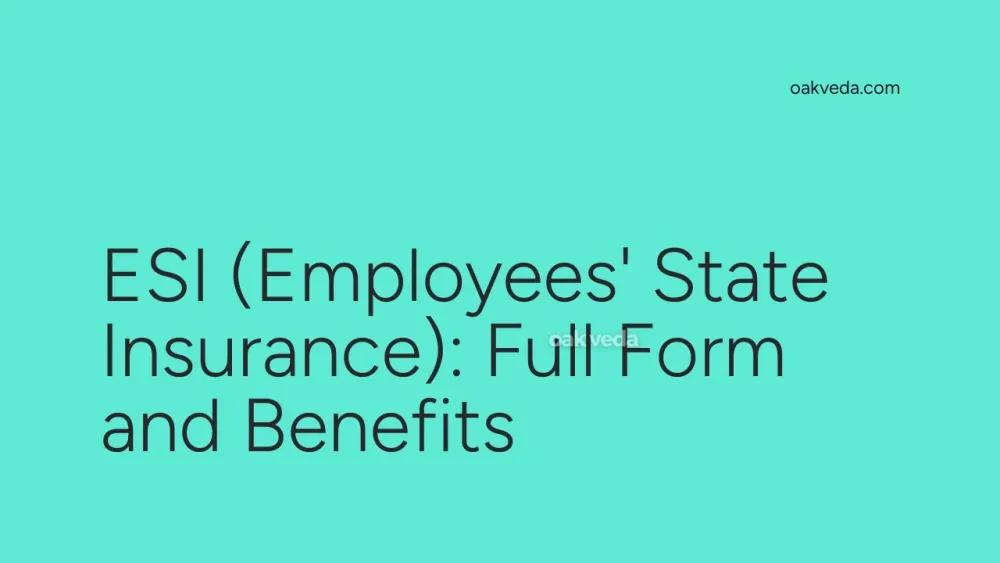
What is the Full Form of ESI?
The full form of ESI is Employees' State Insurance. It is a comprehensive social security and health insurance scheme designed to protect Indian workers and their families.
What is Employees' State Insurance?
Employees' State Insurance is a self-financing health insurance plan that provides medical care and financial benefits to Indian workers in various sectors. The scheme is managed by the Employees' State Insurance Corporation (ESIC), an autonomous body under the Ministry of Labour and Employment, Government of India.
Origin and Development of Employees' State Insurance
The origins of ESI can be traced back to the 1940s:
- In March 1943, the Indian Government commissioned Professor B.N. Adarkar to prepare a report on a health insurance scheme for Indian workers.
- This report laid the foundation for the ESI Act of 1948, which recognized the need to protect workers from various contingencies affecting their ability to earn.
- The ESI scheme was officially implemented on February 24, 1952, in Kanpur.
- Initially limited to factory workers, the scheme has since expanded to cover various sectors and employees earning below a specified wage ceiling.
How does Employees' State Insurance work?
ESI operates on a contributory basis:
- Both employers and employees contribute to the ESI fund.
- The contribution is calculated as a percentage of the employee's wages.
- The collected funds are used to provide medical services and cash benefits to insured persons and their dependents.
Functions of Employees' State Insurance
The primary functions of ESI include:
- Providing comprehensive medical care to insured persons and their families
- Offering cash benefits during periods of sickness, maternity, or disability
- Providing financial support to dependents in case of work-related fatalities
- Promoting preventive healthcare and occupational health services
Applications of Employees' State Insurance
ESI coverage extends to various sectors and establishments:
- Factories and industrial units
- Shops and commercial establishments
- Hotels and restaurants
- Cinemas and theaters
- Newspaper establishments
- Private educational institutions
- Medical establishments
Features of Employees' State Insurance
Key features of the ESI scheme include:
- Comprehensive Coverage: Protects workers against various contingencies
- No-Profit Model: Operates on a non-profit basis for the benefit of workers
- Wide Network: Extensive network of hospitals, dispensaries, and clinics
- Family Coverage: Extends benefits to the worker's family members
- Portability: Benefits can be availed across different states in India
Benefits of Employees' State Insurance
ESI offers a range of benefits to insured persons:
- Medical Benefits: Free medical care at ESI hospitals and dispensaries
- Sickness Benefit: Cash allowance during periods of certified sickness
- Maternity Benefit: Financial support and medical care for expectant mothers
- Disablement Benefit: Compensation for work-related injuries or occupational diseases
- Dependent Benefit: Financial support to dependents in case of work-related death
- Unemployment Allowance: Financial assistance during periods of involuntary unemployment
Limitations or Challenges of Employees' State Insurance
Despite its benefits, ESI faces some challenges:
- Limited Wage Ceiling: Only covers employees earning below a specified amount
- Quality of Services: Concerns about the quality of medical services in some ESI facilities
- Awareness Issues: Lack of awareness among workers about their rights and benefits
- Administrative Hurdles: Delays in claim processing and benefit disbursement
Future Developments in Employees' State Insurance
The ESIC is continuously working to improve and expand the ESI scheme:
- Digital Transformation: Implementing online services for easier access and claim processing
- Infrastructure Upgrade: Modernizing existing hospitals and establishing new medical facilities
- Coverage Expansion: Extending the scheme to new sectors and geographical areas
- Skill Development: Providing vocational training to insured persons and their family members
FAQs on ESI Full Form
-
Who is eligible for ESI coverage? Employees earning up to ₹21,000 per month in covered establishments are eligible for ESI benefits.
-
Is ESI mandatory for all employers? ESI is mandatory for establishments with 10 or more employees in most states of India.
-
What is the current contribution rate for ESI? As of 2023, the employer contributes 3.25% and the employee contributes 0.75% of the monthly wages.
-
Can I choose my own hospital under ESI? Generally, you need to use ESI-empaneled hospitals. However, in emergencies, treatment at other hospitals may be reimbursed.
-
How can I check my ESI status? You can check your ESI status online through the ESIC website using your insurance number.
Employees' State Insurance plays a crucial role in providing social security to millions of Indian workers. By offering comprehensive health coverage and financial protection, ESI contributes significantly to the well-being of the workforce and their families. As the scheme continues to evolve and expand, it remains an essential component of India's labor welfare system.
You may be interested in:

